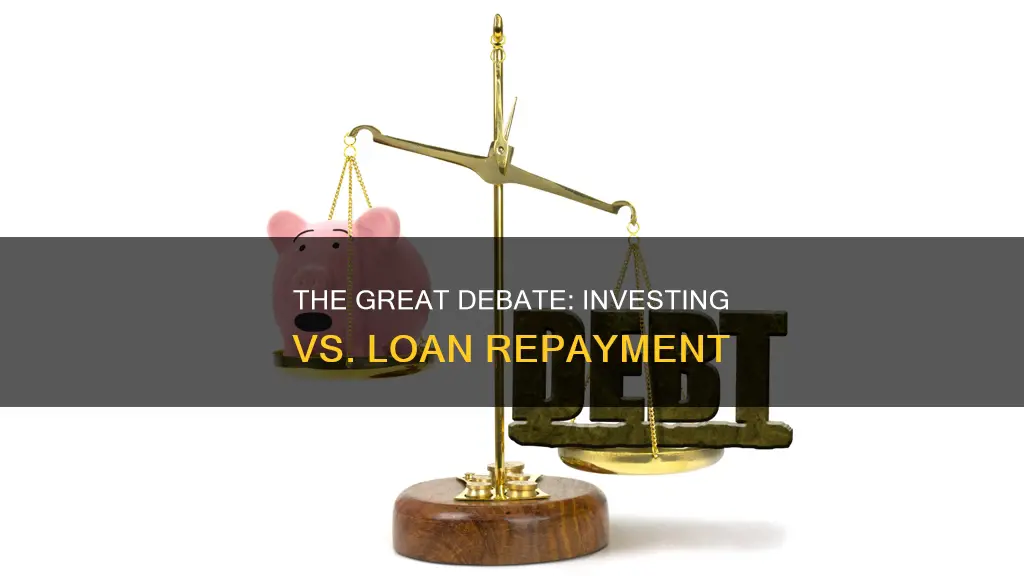
Deciding whether to pay off debt or invest can be a difficult decision. Both are worthy goals, and either choice can make sense depending on the circumstances.
If you have extra cash, you could use it to pay off your debt or put it towards investments that will grow in the future. If you have high-interest debt, it's usually best to pay that off first, as it will cost you more over time. Credit cards often carry the highest interest rates, so it's a good idea to focus on paying those off first.
On the other hand, if you can earn more on your investments than your debts are costing you in interest, then investing may be the better option. For example, if you have a mortgage with a 5% interest rate and a stock market index fund that is returning 10% per year, you will benefit more by investing in the index fund.
It's also important to consider your risk tolerance and emotional state. If you are comfortable with the idea of your investments fluctuating with the market, then investing may be a good choice. However, if the stress of debt is keeping you awake at night, you may want to prioritise paying it off.
Ultimately, the decision to pay off debt or invest depends on your individual circumstances, the type of debt you have, and your financial goals.
| Characteristics | Values |
|---|---|
| Interest rate on debt | If the interest rate on your debt is 6% or more, pay off debt before investing. If it's lower, it may make more sense to invest. |
| Type of debt | Credit card debt often has high interest rates, so focus on paying this off first. |
| Credit score | Paying off debt can improve your credit score, especially if your credit cards are maxed out. |
| Risk tolerance | If you are comfortable with the risk of volatile investments, investing may be a better option. |
| Peace of mind | If debt is causing you stress, there is nothing wrong with paying it off sooner. |
| Retirement | If your employer matches your 401(k) or 403(b) contributions, take advantage of this before paying off debt or investing elsewhere. |
| Emergency fund | Save at least 3-6 months' worth of expenses in an emergency fund before paying off debt or investing. |
What You'll Learn

Weigh up the interest on your debt against the potential returns on your investments
Weighing up the interest on your debt against the potential returns on your investments is a good way to decide whether to pay off your loans or invest.
As a general rule, if you can earn more interest on your money by investing it than your debts are costing you, then it makes sense to invest. For example, if you have a mortgage with an interest rate of 5% and a stock market index fund that is returning 10% per year, you’ll be better off investing your extra cash in the index fund.
On the other hand, if you have credit card debt at 20%, you would be better off putting your extra cash toward paying that debt rather than investing. If you have high-interest debt, it is generally recommended to pay this off before investing.
However, it isn't always that straightforward. Investments can be volatile. That index fund might be up 10% this year but down 10% next year. While there are some investments that pay a guaranteed interest rate, such as bank certificates of deposit (CDs) and U.S. Treasury bills, they tend to have low rates of return that rarely exceed the interest rates charged by credit card companies and other lenders.
Another factor to consider is your risk tolerance. If you are comfortable taking the gamble that your investments will fluctuate with the markets, then you are a better candidate for investing than someone who would worry about market movements.
If you are losing sleep over your debts, then you could be better off repaying them, even if you might get a better return on your money by investing.
Nike: A Smart Investment Choice?
You may want to see also

Consider the impact on your credit score
Paying off your loans can have a positive or negative impact on your credit score in the short term. Here are some factors that can influence this:
Credit Utilization
A significant factor in credit scores is credit utilization, which is the portion of your credit limits that you are currently using. Usually, paying off a credit card helps lower your credit utilization as your remaining balances are now a smaller percentage of your overall credit limit. However, if you close the account you just paid off, you lose that account's credit limit, and your other balances now represent a greater percentage of your total limit, which can lower your credit score.
Average Age of Your Accounts
Credit score calculations favour longer credit histories. The FICO scoring model, for example, includes the age of your closed accounts in its scores. So, if you pay off a loan or credit card and close it out, that could reduce the age of your accounts in the calculations, potentially lowering your credit score.
Credit Mix
Creditors like to see that you can manage a mix of installment accounts (with set payments over a specific time, like a loan) and revolving accounts (with varying payments and no set end date, such as credit cards). If you pay off a loan and your remaining open accounts are all credit cards, your credit mix will be affected, and your credit score may dip.
Payment History
Your track record of paying back debts on time is a critical component of your credit score. A history of prompt payments helps your score, while late or missed payments hurt it.
Length of Credit History
The longer your history of responsible credit management, the better your score will be. Lenders prefer to see a longer credit history as it gives them a better opportunity to assess your repayment pattern.
New Credit Applications
Each time you apply for a new line of credit, it counts as a "hard inquiry" and can result in a small, temporary decline in your credit score. Opening multiple credit accounts in a short amount of time can be riskier, especially if you don't have a long-established credit history.
Overall Impact
While paying off your loans can impact your credit score in different ways, it is still generally beneficial for your financial health. Reducing debt will lower your debt-to-income ratio, which lenders will view positively if you seek out a new line of credit. Additionally, you will have more flexibility with your finances, and you will no longer accrue interest charges on the loan's balance.
In conclusion, while there may be some short-term impacts on your credit score, paying off your loans is still a positive step towards achieving financial freedom and improving your overall financial health.
The Student Debt Dilemma: Invest or Repay?
You may want to see also

Assess the pros and cons of paying off debt first
Paying off debt first can be a great feeling, but there are pros and cons to doing so. Here are some points to consider:
Pros:
- Save money on interest: The longer you owe money, the more interest you'll pay. Paying off debt early can save you hundreds or even thousands of dollars in interest payments.
- Free up cash: Paying off debt means you'll have fewer monthly payments and more cash on hand each month to put toward other financial goals or purchases.
- Peace of mind: Debt can be stressful, and paying it off can bring peace of mind and improve your quality of life.
- Secure your future: Getting out of debt can help you secure your finances for the future. You'll be able to put money into an emergency fund, a retirement account, or other investments.
Cons:
- Cash flow problems: Paying off debt early may cause short-term cash flow problems as money that would be available to you is instead going to your lender. You may need to adjust your budget and reduce spending in other areas.
- Limited impact on interest: In some cases, such as with mortgages, you pay most of the interest early on, and payments count more toward the principal later. Paying off this type of debt early may not make a significant difference in interest saved.
- Penalty for early repayment: Some loans, typically mortgages, have penalties for paying them off early, as the lender doesn't collect as much interest.
- Negative impact on credit score: Paying off non-credit card debt early might actually lower your credit score, as scoring models view revolving accounts (credit cards) differently from installment loan accounts (mortgages, student loans).
Investments: What's Cheap Now?
You may want to see also

Evaluate the benefits of investing early
Investing early has many benefits, and it can be a good idea to start as soon as possible. Here are some advantages of investing early:
- Time allows you to take risks: When it comes to investing, ventures that are more volatile tend to yield the highest return on investment. Investors who have more time before retirement can recover if something goes wrong and can, therefore, afford to make riskier moves.
- Compound interest: Compound interest is the interest earned on interest. By continuously reinvesting your earnings, you exponentially increase your return on investment. The earlier you start, the more time your money has to grow.
- Improved spending habits: Investing early encourages disciplined spending habits, such as focusing on a balanced budget and cutting expenses when necessary.
- Get ahead: The earlier you begin investing, the better your financial situation will be in the future. You will be able to afford things that others can't and will be prepared for any financial instability.
- Improved quality of life: Early investment reduces the risk of being forced to make reckless choices to secure a stable retirement.
- Higher risk tolerance: The more time you have, the more financial risk you can generally tolerate. Younger people tend to have more years of earning ahead of them, so they can often afford to take on more risk in their investment activities.
- Financial freedom: Investing early can provide the freedom to pursue passions and make financial decisions from a place of confidence, rather than fear.
- Financial security: Investing early secures your financial future and provides a safety net in the event of an emergency.
- Early retirement: Early retirement is an option if you start investing early in life.
- Regret: If you don't invest early, you may look back with regret at years of financial opportunity wasted.
Target: Invest Now or Miss Out?
You may want to see also

Think about your risk tolerance and emotions
When deciding whether to invest or pay off loans, it's important to consider your risk tolerance and emotions. Risk tolerance refers to the amount of risk you can handle when investing, and it can be divided into two parts: financial and emotional. Emotional risk tolerance is about what you can handle emotionally, while financial risk tolerance is about how your finances can handle different risks.
To determine your financial risk tolerance, consider how much money you can afford to lose. If you are struggling financially, investing a large portion of your paycheck may not be the best decision, as you need that money for other essential purposes. In this case, it might be wiser to put aside a small amount and take advantage of dollar cost averaging to prepare for the future without sacrificing your current financial stability. On the other hand, if you have extra money, you may want to invest a larger sum or take on riskier investments, as long as you are comfortable with potentially losing that money.
Emotional risk tolerance is about how you handle risk mentally and psychologically. Some people have a high emotional risk tolerance and enjoy the thrill of volatile markets or high-risk investments. However, it's important to be careful if you have a high emotional risk tolerance but low financial risk tolerance, as it can be easy to get carried away and make impulsive decisions. On the other hand, if you have a low emotional risk tolerance, investing in high-risk situations may cause constant worry and stress, which can negatively impact your health and relationships. In this case, it's advisable to stick with safer investments, such as solid value/dividend stocks, index funds, or stable bonds.
It's crucial to understand your own risk tolerance before making investment decisions. While investing in higher-risk assets may offer greater returns, it's important to consider your financial situation, goals, and emotional well-being when deciding whether to invest or pay off loans.
Additionally, it's worth noting that debt can often cause stress and anxiety. If the weight of debt keeps you awake at night, there is nothing wrong with prioritising paying it off sooner, even if the math suggests investing may be a more profitable option. Ultimately, the decision to invest or pay off loans depends on your personal risk tolerance and emotional well-being.
Dubai's Investment Trends
You may want to see also
Frequently asked questions
Paying off your loans before investing can reduce your monthly expenses and improve your credit score. It can also remove the unpredictability of paying more interest if you have a variable interest rate loan.
Yes, paying off your loans may limit your opportunity to make money on those funds.
Investing has the potential to generate higher returns than paying off debt, especially over the long term. It is also an essential part of building wealth over time.
Yes, if your interest rate debts are higher than average returns, you may be losing more to interest payments than you would be gaining through investing.







